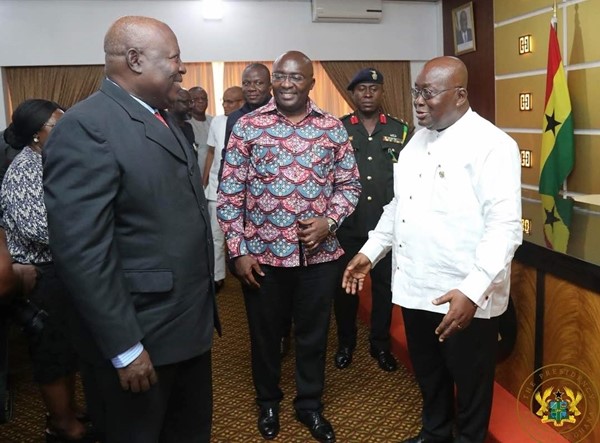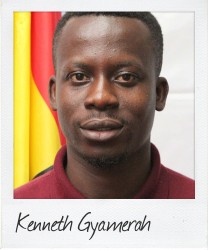“Independent Prosecutor to fight corruption”
February 5th, 2018Corruption has been a major threat to the development of Africa, writes Kenneth Gyamerah, 27, a Commonwealth Correspondent from Kumasi in Ghana, who describes a new post Ghana has created to fight corruption.
To build a more fair society where every child will have the opportunity to get education and accomplish their goals, corruption must be eradicated from Africa.
During the early 1980s, many government officials who siphoned state funds faced the death penalty in Ghana, but this could not stop the menace. In the last 10 years, corrupt activities have spread like wildfire. The public wallet has suffered from the corrupt activities of government officials and public sector workers.
The unemployment rate in Ghana keeps galloping. Many people are wallowing in abject poverty because the money intended for development of the country is directed to the pockets of a few people, who enrich themselves and their families to the detriment of the citizens.
During his campaign trail, President Nana Akuffo Addo promised Ghanaians that he would protect the public wallet and set up an independent Office of the Special Prosecutor, which will deal with prosecuting corrupt government officials and public sector employees.
In January 2017, Nana Akufo Addo took power from the incumbent to steer affairs as the president of the Republic of Ghana. Within one year of his administration, Parliament passed the Special Prosecutor’s Bill.
The purpose of the Bill is to establish the Office of the Special Prosecutor as a specialised agency to investigate specific cases of corruption involving public officers and politically exposed persons in the performance of their functions, as well as individuals in the private sector implicated in the commission of corruption. The Office would then prosecute these offences on the authority of the Attorney-General.
The establishment of the Office of the Special Prosecutor has become necessary in view of the institutional bottlenecks that impede the fight against corruption. The monopoly of prosecutorial authority by an Attorney-General, who is hired and fired by the President, has been singled out by governance experts as one of the key factors that stand in the way of using law enforcement and prosecution as credible tools in the fight against corruption.
To this end, government intends to establish, by an Act of Parliament, an Office of the Special Prosecutor to investigate and prosecute certain categories of cases and allegations of corruption and other criminal wrongdoing, including those involving alleged violations of the Public Procurement Act, 2003 (Act 663) and cases implicating public officers and politically exposed persons.
Establishing the Office to prosecute public corruption cases will undoubtedly yield positive results in the number of corruption cases prosecuted, more so than a multi-purpose or mixed mandate agency such as the Economic and Organised Crime Office. The bill therefore seeks to vest the Special Prosecutor with the authority and control required to effectively investigate and prosecute corruption, and restore public confidence in the justice delivery system – and, by extension, government.
Barely a month after parliament passed the bill, the President nominated Mr. Martin Alamisi Burnes Kaiser Amidu, a lawyer and renowned anti-corruption crusader, as the Special Prosecutor to investigate and prosecute certain categories of corruption in Ghana.
“I have done so because I am fully convinced that Mr. Martin Amidu, a prominent legal personality who held the high office of the Attorney General of the Republic in the government of the late President John Evans Attah Mills, has the requisite integrity, competence, courage and independence of character to discharge effectively the responsibilities of this office,” President Nana Akufo Addo said in his speech.
The entire nation commends the president for taking this bold step. I believe it’s a step in the right direction, and that other African countries should learn from Ghana’s example.
Photo credit: Ghana Presidency – Martin Amidu (left) interacting with the president (right) and Vice President (centre)
…………………………………………………………………………………………………………………
About me: I am a youth activist, writer and a professional teacher.
I am an enthusiast on all issues concerning youth, and feel fulfilled through engaging in policy related discussions and deliberations on youth empowerment and development. I am passionate about organising for a global youth agenda, and want to be the voice for the less privileged in Ghana.
My interests lie in advocacy, writing and teaching, which has led to involvement with a number of global youth-related organizations.
…………………………………………………………………………………………………………………
Opinions expressed in this article are those of the author and do not necessarily represent the views of the Commonwealth Youth Programme. Articles are published in a spirit of dialogue, respect and understanding. If you disagree, why not submit a response?
To learn more about becoming a Commonwealth Correspondent please visit: http://www.yourcommonwealth.org/submit-articles/
…………………………………………………………………………………………………………………





